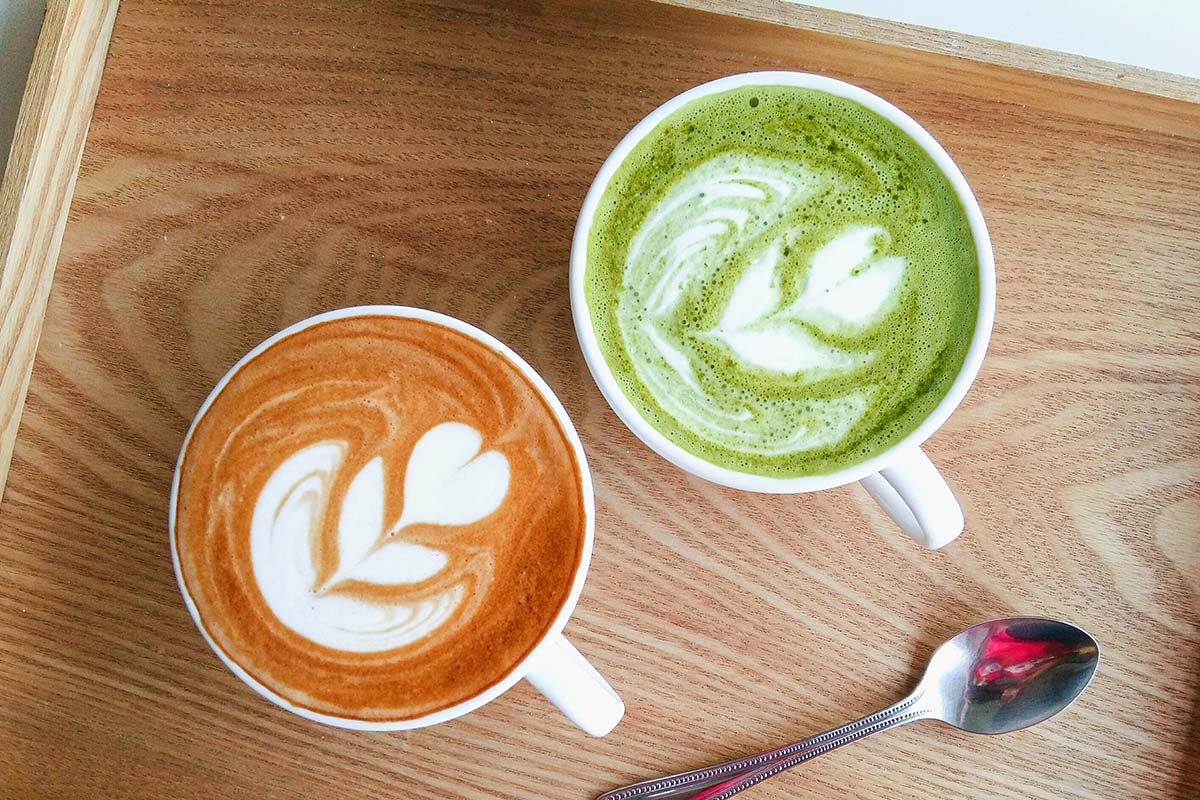Advertisement
Coffee versus Matcha: Which Is Right for You?
How two of the world’s most popular beverages stack up
Fact-Checked
This article has been written and fact-checked by experts in the field.

Caffeine content
Do you prefer coffee’s robust flavor and caffeine kick, or the calming energy boost of an earthy-tasting matcha green tea? Which brew is best is an ever-growing debate—with strong arguments on both sides. Both beverages have a unique chemistry offering you a range of health benefits and sipping pleasure.

Caffeine is a driving force behind our love for coffee and tea. The exact amount of caffeine in each beverage varies with the quality, variety, and preparation method. On average, brewed coffee contains 65 to 120 mg of caffeine per cup, with the Arabica variety of beans slightly lower in caffeine than the Robusta variety. The average cup of matcha, typically made with 1/2 tsp of matcha powder, contains 38 to 88 mg. Although it contains less caffeine than coffee, matcha offers a higher caffeine buzz than other forms of green tea.
Taste

Does the earthy aroma of fresh coffee grounds or the grassiness of matcha powder leave you swooning for a cup? Both coffee and matcha have a distinct taste and smell. Coffee contains more than 800 volatile compounds that can give it a wide range of flavor notes, including fruity, nutty, chocolatey, floral, or earthy. Matcha is considered the most aromatic green tea. Special shade-growing practices infuse matcha leaves with a unique chemistry that results in an umami taste and less bitterness than other teas.
Nutrients

Both coffee and matcha tea are antioxidant powerhouses that protect your body against oxidative stress. Coffee is abundant in chlorogenic acid, which helps lower inflammation. It is also a source of niacin (vitamin B3) and the minerals potassium and magnesium. Matcha is famous for its catechins, especially epigallocatechin gallate (EGCG), which boosts physical and mental health. Matcha also supplies amino acids, manganese, copper, iron, and zinc, and even vitamin C.
Health benefits

Both coffee and matcha offer plenty of health benefits—though their distinct compositions affect the body in different ways.
Advertisement
Energy

With its high caffeine content, coffee stimulates the central nervous system, enhancing alertness, improving mental focus, and temporarily combating fatigue. The caffeine from coffee can even rev up physical performance by triggering adrenaline release and improving muscle contraction. If coffee’s stimulating effects leave you jittery, matcha elicits a gentler and more sustained energy boost. Matcha’s unique combination of caffeine and the amino acid L-theanine improves alertness without causing the jitters or caffeine crash associated with coffee.
Advertisement
Mood

Feeling anxious? The L-theanine in matcha acts as a natural stress buster. L-theanine stimulates the production of alpha brain waves, the form of brain activity linked with a relaxed yet alert state of mind. Research shows that college students who take matcha daily have lower levels of stress chemicals in their body. Coffee is also a potential mood booster. Studies show that people who drink coffee have lower rates of depression, with one and a half cups providing optimal benefits.
Advertisement
Heart health
Advertisement
Antioxidant polyphenols are the superheroes of heart health—and both coffee and matcha are packed with them. Studies show that drinking a moderate amount of coffee (3 to 5 cups per day) may lower your risk of cardiovascular disease, including stroke and heart failure. Matcha’s main cardioprotective effects are thanks to EGCG, which helps protect heart tissues from inflammation and free radical damage.
Advertisement
Lower cancer risk

The EGCG and L-theanine found in matcha may enhance the body’s natural cancer-fighting activities. Evidence has been especially promising for lowering the risk of breast cancer reoccurrence. For many people, drinking coffee contributes more to the day-to-day intake of dietary antioxidants than fruit and vegetables. Likely as a result of this antioxidant intake, health surveys show that people who drink multiple cups of coffee have an 18 percent lower incidence of cancer than people who drink very little coffee.
Advertisement
Weight management

Matcha makes a wonderful addition to any healthy weight management program. Not only can drinking matcha help lower the tendency to overeat, but its combination of EGCG and caffeine also helps stabilize blood sugar levels and increase fat metabolism. Likewise, the combination of caffeine and antioxidants in coffee can help steady blood sugar levels and improve fat metabolism. In one study, people who were able to maintain their healthy weight were found to drink significantly more cups of coffee than the general public.
Preparation

Coffee and matcha each hold their own unique preparation methods. A classic cup of coffee begins with freshly ground beans, followed by carefully measuring the grounds into a filter or press for the desired strength. Coffee experts recommend 1 to 2 Tbsp of ground coffee per 3/4 cup of water. Boiling water is then poured over the coffee grounds to extract their essential oils, flavors, and nutrients into a rich and aromatic brew. Unlike looseleaf green tea, matcha is made from finely powdered tea leaves that are stirred directly into hot water at a ratio of about 1/2 tsp per cup of water. Matcha connoisseurs suggest whisking the powder vigorously in a zigzag motion until it is well combined and a frothy layer forms on top.
So, what’s our verdict in the coffee versus matcha debate? Choose whichever one you prefer! If you favor a quick caffeine hit, opt for coffee. If you find coffee too stimulating, try matcha. Both beverages have a lot to offer when it comes to nutrition, health benefits, and flavor, so the choice comes down to personal preference.






